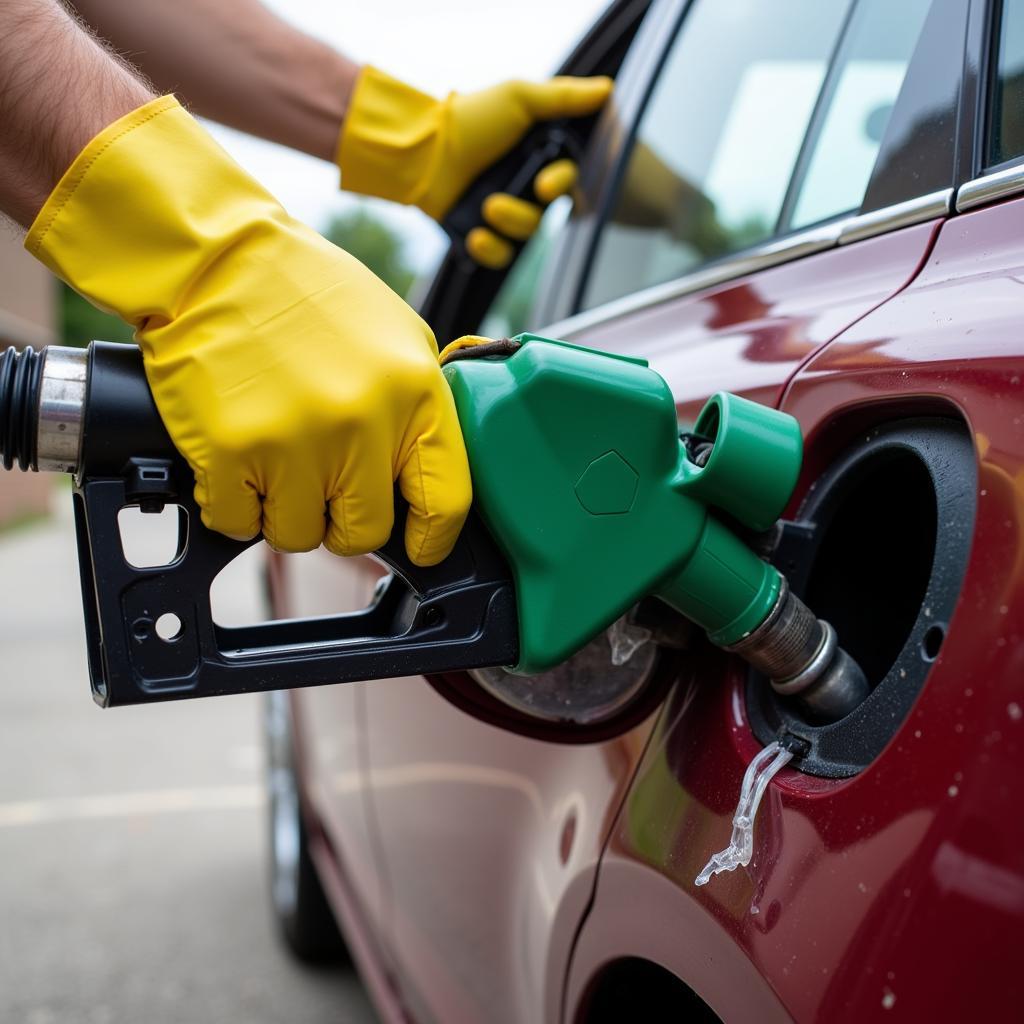Dealing with old gas in your car can be a frustrating experience. Whether your car has been sitting idle for a while or you’ve accidentally filled up with the wrong fuel, knowing how to address this issue can save you time and money. This guide offers a comprehensive overview of the problems associated with old gas, effective solutions, and preventative measures.
If you’re facing issues related to other car repairs, you might find valuable information on how to fix a leaking radiator in your car.
Understanding the Problems with Old Gas
Old gasoline can cause a variety of problems in your vehicle. As gasoline ages, it begins to oxidize and evaporate, leaving behind a gummy residue that can clog fuel lines, injectors, and the carburetor. This can lead to poor engine performance, difficulty starting, and even complete engine failure. Furthermore, the degraded fuel can negatively impact fuel economy and increase emissions.
Diagnosing Old Gas Issues
Several symptoms can indicate problems stemming from old gas. These include:
- Difficulty starting: The engine cranks but struggles to fire up.
- Rough idling: The engine runs unevenly at idle.
- Poor acceleration: The car hesitates or lacks power when accelerating.
- Stalling: The engine cuts out unexpectedly.
- Reduced fuel economy: You notice a decrease in miles per gallon.
- Strange odor: A noticeable varnish-like smell from the fuel.
Old Gas in Car Fix: Solutions
Several methods can be employed to fix issues related to old gasoline. The best approach depends on the severity of the problem and the age of the gas.
Draining the Old Gas
For severely degraded fuel, completely draining the tank is the most effective solution. This involves removing the old gas and replacing it with fresh fuel.
- Safety First: Disconnect the negative battery terminal. Work in a well-ventilated area and avoid any open flames.
- Access the Fuel Tank: Locate the fuel tank drain plug or use a siphon pump.
- Drain the Fuel: Carefully drain the old gas into an approved container. Dispose of the old fuel responsibly.
- Refill with Fresh Fuel: Add fresh, high-quality gasoline to the tank.
 Draining Old Gasoline from a Car
Draining Old Gasoline from a Car
You can find more helpful tips on fixing various car problems on our website, including guides on car exhaust fixing and how to fix car code p0300.
Using a Fuel Stabilizer
Fuel stabilizers can help prevent gasoline from oxidizing and evaporating, especially if you anticipate storing your vehicle for an extended period. Adding a fuel stabilizer to a partially filled tank can extend the life of the gas and prevent the formation of harmful deposits.
Fuel System Cleaning
For less severe cases, a fuel system cleaning can help remove deposits and restore performance. This usually involves using a fuel additive that cleans injectors, fuel lines, and other components.
“Regularly using a fuel stabilizer is a proactive way to prevent old gas problems, particularly for vehicles that are not driven frequently,” advises John Miller, a seasoned automotive engineer with over 20 years of experience.
Preventing Old Gas Problems
Preventing old gas issues is often easier than dealing with the consequences. Here are a few preventative measures:
- Fill the tank regularly: A full tank minimizes the air space, reducing the rate of oxidation and evaporation.
- Use a fuel stabilizer: Add a stabilizer to the tank, especially before storing your car for a long period.
- Drive your car regularly: Regular use keeps the fuel circulating and prevents it from becoming stale.
- Store your car properly: If you plan on storing your vehicle, choose a cool, dry location.
“A full fuel tank acts as a barrier against moisture and air, significantly reducing the chances of fuel degradation,” explains Emily Carter, a leading expert in automotive fuel systems.
Conclusion
Old gas in your car can cause a range of problems, from difficulty starting to complete engine failure. By understanding the causes, recognizing the symptoms, and implementing the correct solutions, you can effectively address these issues and keep your vehicle running smoothly. Prevention is key, and following the preventative measures outlined above can help you avoid old gas problems altogether. For further assistance or personalized advice, connect with AutoTipPro at +1 (641) 206-8880 or visit our office at 500 N St Mary’s St, San Antonio, TX 78205, United States. We’re here to help you with all your automotive needs. If your car is overheating, check out our guide on how to fix a stuck thermostat on a car.




Leave a Reply